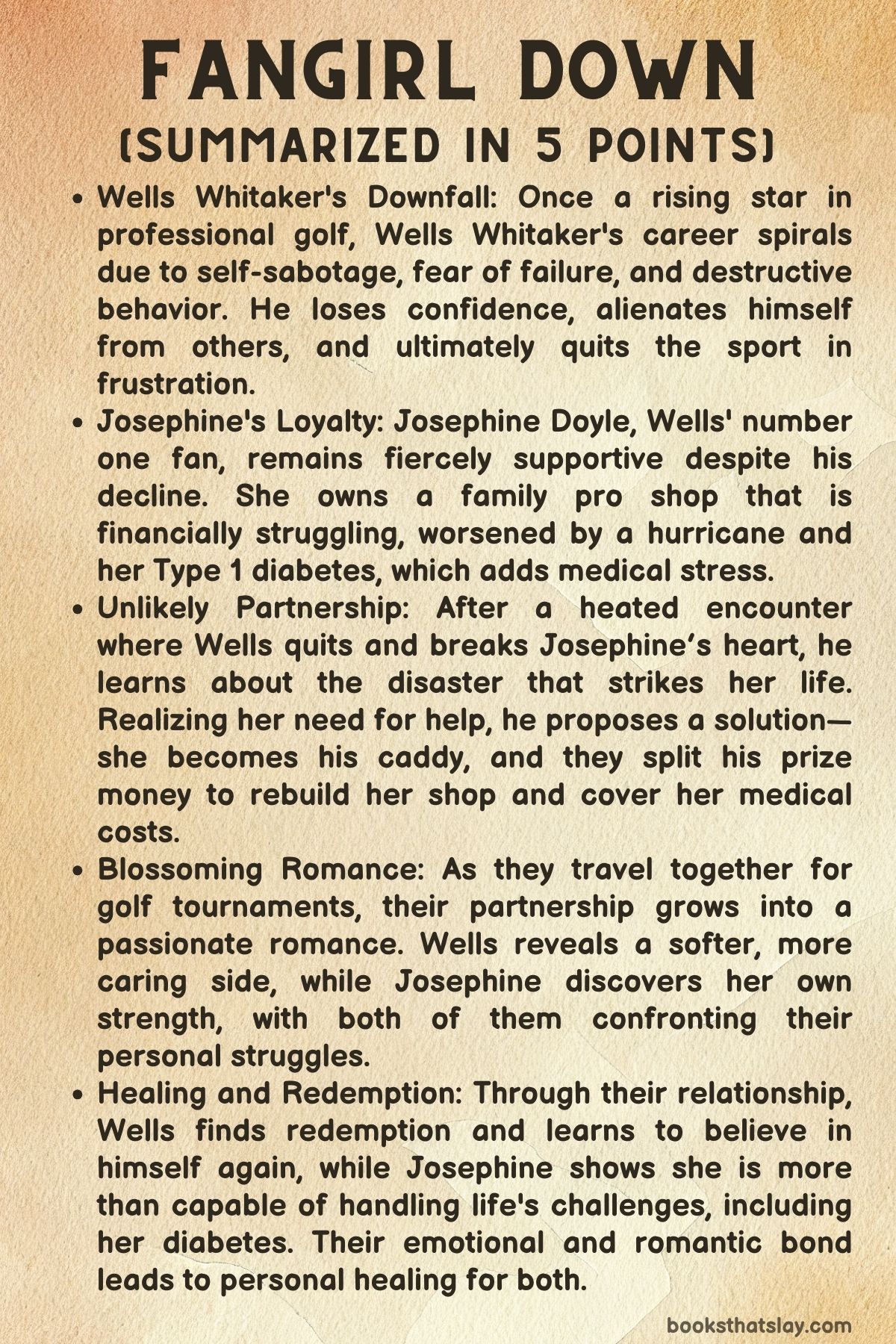Fangirl Down by Tessa Bailey Summary, Characters and Themes
Fangirl Down by Tessa Bailey is the first book in her Big Shots series, blending romance, personal growth, and sports drama in a story about second chances. The novel centers on Wells Whitaker, a once-promising golf star whose career has crumbled due to self-destructive behavior, and Josephine Doyle, his devoted number one fan.
When Josephine’s life is upended by a natural disaster and mounting financial struggles, Wells proposes an unconventional partnership: she becomes his caddy, and he’ll help her get back on her feet. Their professional relationship quickly ignites into a whirlwind romance, filled with humor, passion, and personal healing.
Summary
Wells Whitaker is a professional golfer whose once-brilliant career has been derailed by a series of poor performances and destructive choices. Known for his grumpy demeanor and self-sabotaging ways, Wells has been slipping further into obscurity, driven by fear of failure and abandonment.
His one constant supporter is Josephine Doyle, a devoted fan who follows him from tournament to tournament, holding up a sign that reads “Wells Bell.” Despite his downslide, she continues to believe in him, even when Wells no longer believes in himself.
Josephine, who owns a family-run pro shop in Florida, is equally struggling in her personal life.
The shop, a legacy from her family, is on the brink of collapse after years of financial mismanagement.
To make matters worse, Josephine’s Type 1 diabetes adds extra pressure, with medical costs piling up and her insulin supply running dangerously low. Her blind optimism and faith in Wells seem to be the only bright spots in her difficult life.
During a critical moment at one of Wells’ tournaments, the pair finally meet in person. Josephine, offering encouragement, urges Wells to find his inner strength and turn his life around.
Instead, Wells lashes out in frustration, tearing her sign in half and abruptly quitting golf on the spot. Heartbroken, Josephine returns to Florida, determined to move on from her “fangirl” life.
However, a hurricane devastates Josephine’s pro shop, leaving her financially ruined and unsure how to rebuild her life.
When Wells learns of the disaster, he is jolted out of his downward spiral. Realizing how much Josephine means to him, he rushes to her side in Florida.
Seeing the depth of her troubles, Wells comes up with a bold plan: he will return to the professional golf circuit, and Josephine will become his caddy.
Together, they will split his tournament winnings, providing Josephine with the money she needs to rebuild her shop and get her health back on track.
As they embark on this new partnership, Josephine and Wells are forced into close proximity, traveling together from tournament to tournament.
Their working relationship quickly evolves into something deeper, as Josephine helps Wells regain his confidence on the golf course, and Wells, in turn, helps Josephine confront her insecurities about her illness.
The sexual tension between them builds rapidly, with Wells becoming almost obsessively attracted to Josephine.
Despite his gruff exterior, he reveals a surprisingly tender side, doting on her in ways that make their romance feel both intense and deeply emotional.
Ultimately, Fangirl Down is a story about redemption, healing, and love.
While Wells learns to overcome his fears and self-sabotaging tendencies, Josephine proves her strength, both physically and emotionally, in ways that surprise even herself.
Their journey together is full of playful banter, sizzling chemistry, and personal growth as they navigate the professional pressures of golf and their rapidly deepening relationship.

Characters
Wells Whitaker
Wells Whitaker is the male protagonist of the novel, a former rising star in professional golf whose career has spiraled downward due to his self-destructive tendencies. He is portrayed as a “bad boy” with a rough exterior and a gruff, moody personality.
Despite his early success in the sport, he struggles with feelings of inadequacy and fear of abandonment, which drive his erratic behavior. Wells’s chaotic upbringing and volatile nature, including his tendency to get into fights, have isolated him.
His inability to handle failure, coupled with his fear of losing the spotlight, leads him to sabotage his own career, ultimately quitting golf in a moment of rage and self-pity.
Wells’s relationship with Josephine is central to his character development. While he initially comes across as emotionally distant and angry at the world, Josephine’s unwavering support forces him to confront his self-sabotaging nature.
Her loyalty becomes a catalyst for his transformation. After hearing about the hurricane that devastates Josephine’s family’s shop, Wells experiences a moment of clarity, pulling himself out of his drunken stupor and making the decision to help her.
This marks the beginning of his redemption arc, as he not only returns to the professional golf scene but also starts to rebuild his life with Josephine by his side. Throughout the novel, Wells’s character evolves from a self-destructive, emotionally distant figure to someone capable of love, vulnerability, and deep devotion.
However, his overwhelming obsession with Josephine at times can border on intense and even frightening. His romantic gestures—such as brushing her hair, feeding her snacks, and indulging in bubble baths—highlight a softer side beneath his grumpy exterior.
His passionate attraction to Josephine can feel exaggerated, which contributes to the intensity of their relationship.
Josephine Doyle
Josephine is the female protagonist and the heart of the story. A devoted fan of Wells Whitaker, she represents loyalty and optimism, even in the face of adversity.
Josephine has been following Wells’s career closely, supporting him through his highs and lows, and attending his tournaments with a sign that declares her loyalty to him (“Wells Bell”). She is a kind-hearted, sunny character whose belief in Wells never wavers, even when his performance falters and he becomes a source of ridicule.
However, Josephine’s life isn’t without its struggles. She is portrayed as someone who is constantly trying to prove her strength and independence, both to herself and to those around her.
She inherits her family’s pro shop, pouring all her savings into keeping it afloat, which becomes a major source of stress when a hurricane devastates the shop. Josephine’s type 1 diabetes plays an essential role in shaping her character.
Managing her illness is a constant challenge, especially as her financial situation worsens after the hurricane, making it difficult for her to afford her insulin supplies. This vulnerability adds depth to her character, showing that while she strives to be self-reliant, she does need help at times.
Wells offering her the job as his caddy is a significant moment for Josephine. It’s not just about the money to rebuild her life, but it also provides her with the opportunity to show that she’s capable of physical endurance and mental resilience, despite her illness.
As Wells’s caddy, she becomes his partner not only on the golf course but in life. Their evolving romance is marked by Josephine’s initial “fangirl” attraction to Wells deepening into something more substantial as she comes to know him on a personal level.
While she fell for Wells first, it becomes clear that Wells falls even harder, though his intense focus on her physical appearance at times borders on overwhelming. Despite this, Josephine finds herself drawn to the man beneath the gruff exterior, discovering a caring and affectionate side to Wells that surprises her.
Her character arc involves balancing her sense of independence with accepting help and love, both from Wells and those around her.
Themes
The Duality of Self-Destruction and Redemption in Professional Sports
One of the most prominent themes in Fangirl Down by Tessa Bailey is the exploration of self-destructive tendencies within the high-pressure world of professional sports and the road to redemption. Wells Whitaker’s initial success as a professional golfer is rapidly overshadowed by his self-sabotaging behavior.
His chaotic upbringing, destructive habits, and fear of failure drive him to ruin his own career. Despite his talent, Wells struggles to maintain his standing in the world of golf, eventually succumbing to the belief that he is destined to fail.
His behavior reflects the complex emotional and psychological burden that often accompanies fame in professional sports, where the pressure to succeed can fracture an athlete’s sense of self-worth. As Wells spirals into this self-destructive pattern, he isolates himself, alienates his support system, and behaves erratically.
This cycle is reversed only when Josephine’s unwavering belief in him brings him back to the sport and, symbolically, back to life. The duality of Wells’ journey—his descent into ruin and his attempt to reclaim his career—underscores the human vulnerability behind the glamorous veneer of professional sports.
The Intersection of Illness, Financial Desperation, and Personal Identity
Bailey weaves a nuanced narrative around Josephine’s Type 1 diabetes, an illness that is not just a background detail but a key element in her character’s struggle with personal identity and independence. Her chronic illness is compounded by her financial struggles, specifically after the hurricane destroys her family’s pro shop, leaving her without proper insurance coverage.
Josephine’s medical condition is presented as both a physical and psychological burden. She constantly feels the need to prove that she is capable of handling her illness without being a burden on others, which is emblematic of her broader desire for independence and control in her life.
The way her illness ties into her financial instability—particularly the cost of medical supplies and the destruction of her pro shop—creates a thematic exploration of the intersections between health, economics, and self-worth. Josephine’s decision to become Wells’ caddy reflects her desperation but also her resilience, as she leverages this unusual opportunity to regain control over her life.
The theme highlights how illness can complicate an individual’s perception of themselves, particularly when compounded by external financial pressures. This tension can have significant impacts on personal relationships.
Romantic Obsession Versus Emotional Intimacy: The Thin Line Between Passion and Possession
In the relationship between Wells and Josephine, the novel delves into the complex balance between intense romantic attraction and the risk of emotional possession. The romantic dynamic between the two is underscored by Wells’ overwhelming physical attraction to Josephine, which borders on obsessive.
His fixation on her appearance—her skirts, her hair, and her overall physicality—dominates his thoughts, turning his desire into a near-constant preoccupation. While this type of attraction is often romanticized in contemporary romance fiction, Bailey pushes this trope to an extreme, forcing readers to confront the discomfort of romantic obsession.
Wells’ attraction is portrayed as so intense that it can feel unnerving, especially in the context of real-life relationships, where such overpowering fixation would likely raise red flags. Despite the romance’s passionate nature, there is an undercurrent of power dynamics, as Wells is technically Josephine’s boss, a professional arrangement that adds complexity to their personal relationship.
This theme invites readers to consider the fine line between passion and possession. It challenges the traditional “grumpy sunshine” trope, presenting a relationship that, while romantic on the surface, could easily veer into the territory of emotional control.
Resilience and Rebirth Amidst Natural and Personal Catastrophes
The hurricane that devastates Josephine’s pro shop acts as a symbolic parallel to the personal disasters that both protagonists face. The storm, a literal force of nature, mirrors the emotional storms that Josephine and Wells navigate throughout the novel.
For Josephine, the destruction of the pro shop represents the loss of her family’s legacy, her financial security, and, perhaps most importantly, her sense of purpose. In a broader sense, the hurricane serves as a narrative device to strip both characters down to their most vulnerable states, forcing them to rebuild not only their careers but also their identities.
Josephine’s resilience in the face of this catastrophe is key to her character arc. She must confront both the literal destruction of her livelihood and the figurative crumbling of her confidence.
Wells, on the other hand, uses this disaster as a catalyst for his rebirth, as it jolts him out of his self-pity and compels him to act for someone else’s well-being. The theme of resilience emerges as both characters are forced to rebuild their lives amidst both natural and personal calamities, ultimately leading to a narrative of rebirth and recovery.
The Complexity of Power Dynamics in Relationships Born Out of Crisis
Another layered theme in Fangirl Down is the exploration of power dynamics in a relationship that begins from a place of financial desperation and professional dependence. When Wells offers Josephine the position of his caddy, their partnership is born out of a necessity for survival—both financially and emotionally.
Josephine’s decision to accept his offer is not made from a place of equal standing but rather out of a sense of urgency driven by her precarious financial and health situation. Wells’ offer of employment, while framed as a mutually beneficial arrangement, creates an imbalance of power in their personal relationship, complicating their burgeoning romance.
This dynamic raises questions about autonomy, agency, and how economic circumstances can affect emotional connections. As their relationship progresses, Josephine’s role as Wells’ caddy becomes intertwined with her desire to prove her worth—not just to Wells but also to herself and her family.
The theme explores the tension between professional reliance and romantic affection, questioning whether a relationship can flourish when one partner is so dependent on the other for survival and livelihood.


